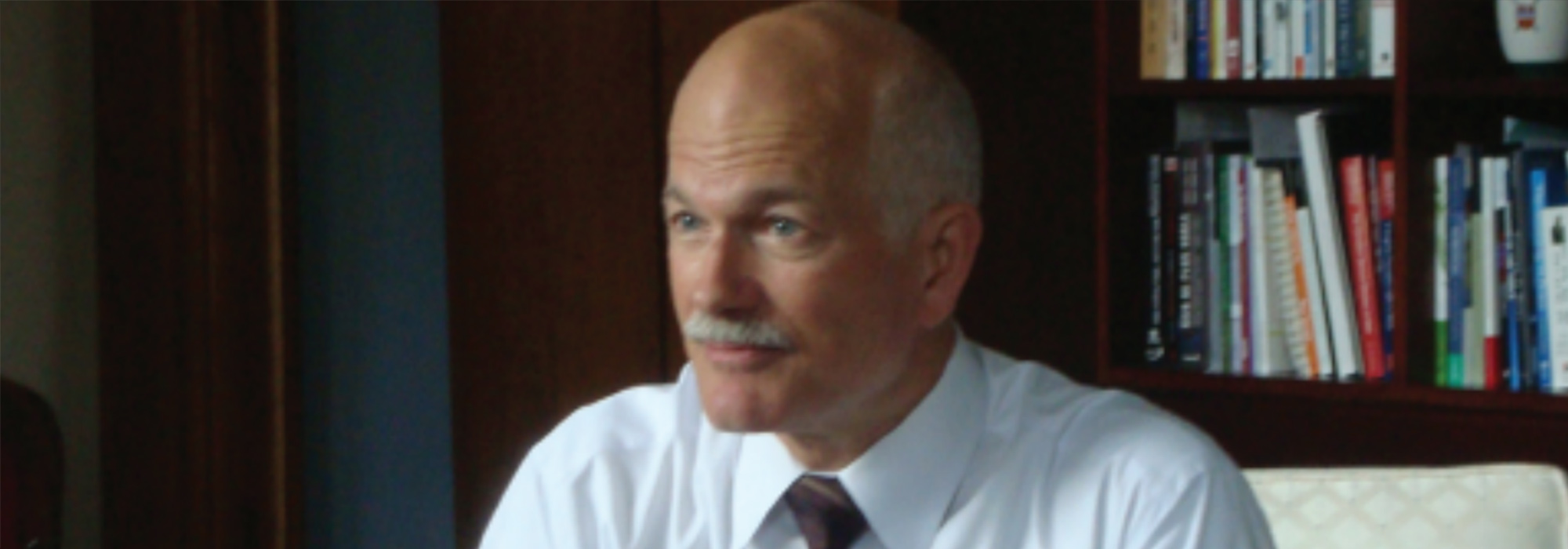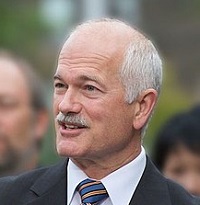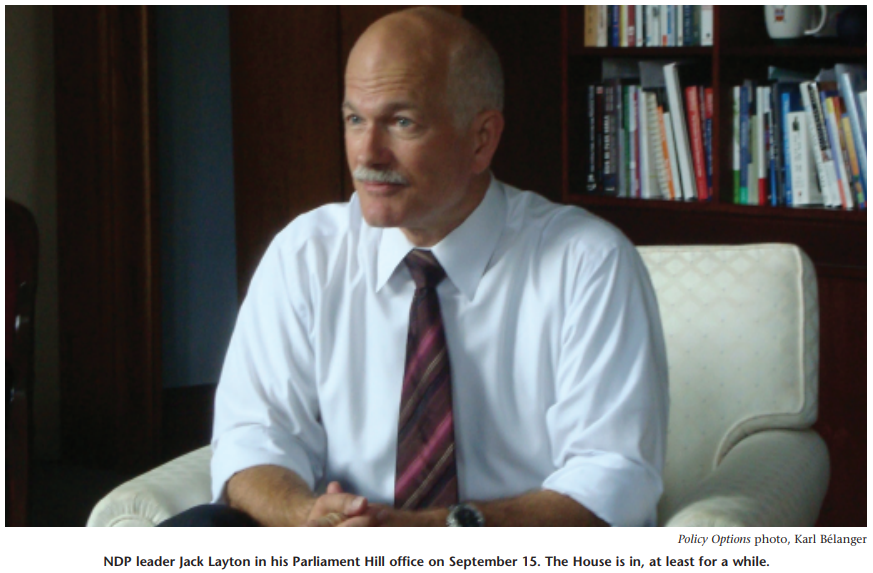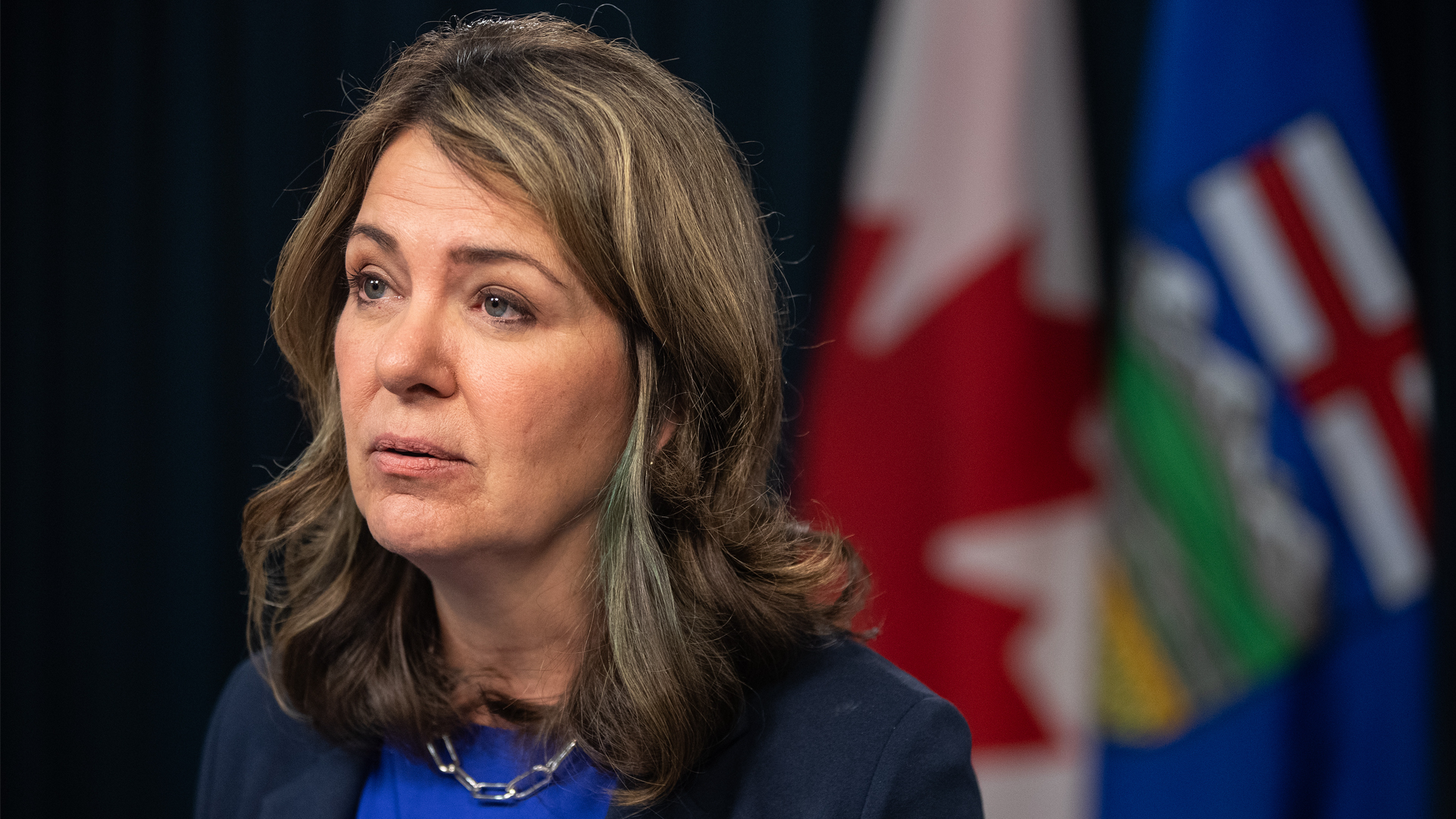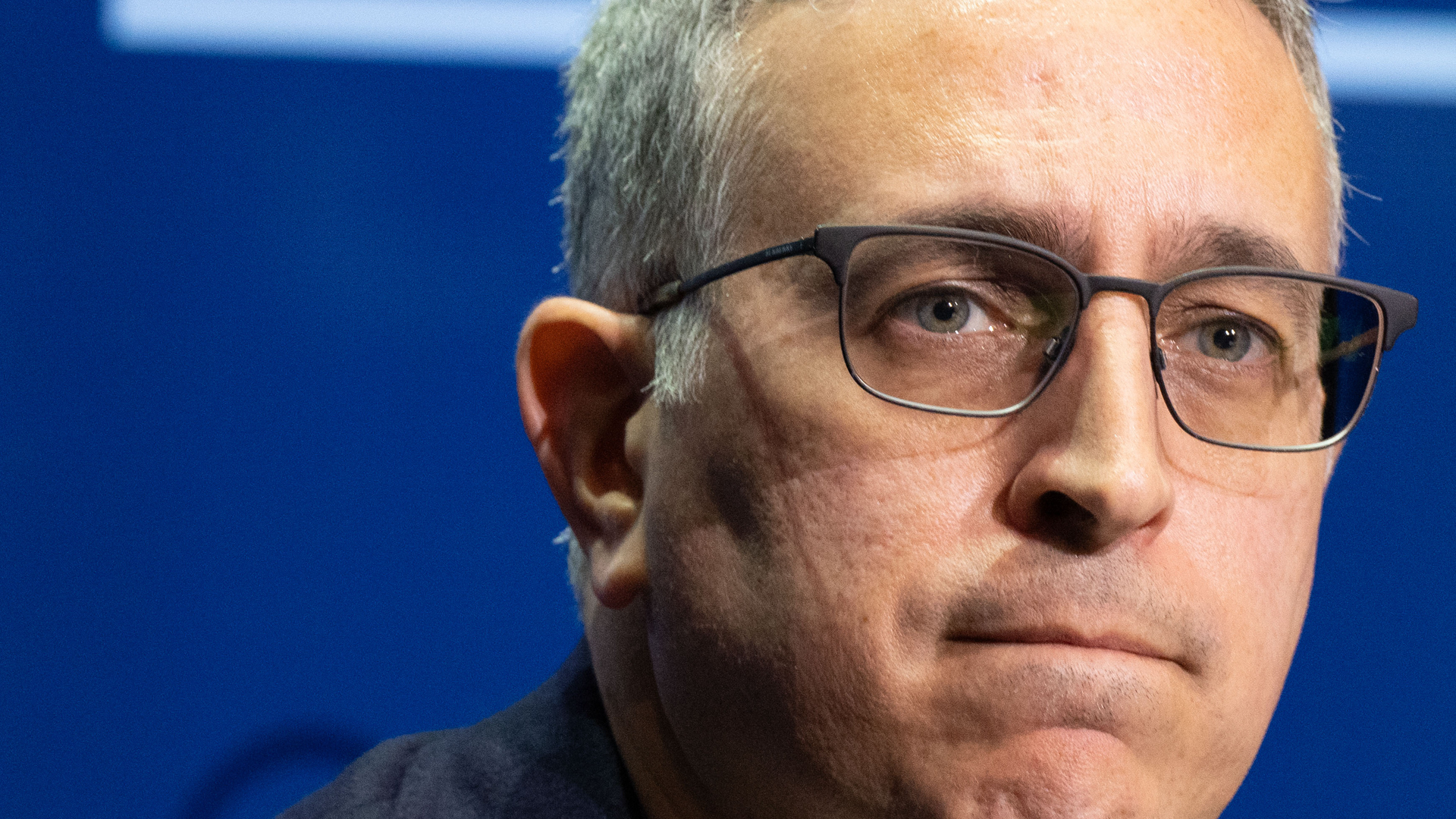
POLICY OPTIONS: Mr. Layton, thanks for doing this. By the time this interview is published in early October, we’re either going to be into an election or we’re still going to be here. What’s your sense of where we’re going to be, on the road or in the House?
JACK LAYTON: I don’t think we can quite predict it as of the date of this interview. We’re September … but I think I know how a lot of Canadians feel about it. I spent my summer meeting with a lot of people … in coffee shops.
PO: You go to Tim Hortons, too?
JACK LAYTON: Yeah. Wayne Marsden in our caucus calls it his Timmy’s poll. I don’t want to advertise a particular brand or anything like that. I go to other coffee shops. The occasional pub, too. Although advice you get in a pub after a certain hour is to be considered in that context and not likely remembered by the adviser. I mean, I really remember the faces of people who, they look you right in the eye and say, “I lost my job. I never thought that would happen to me and my family. I had a good job; middle class, I have a home, you know, a little bit of a mortgage left on it. My kid’s going to university and I don’t have a job. And my wife hasn’t got a job. And here I am; I’m on EI and it’s gonna run out or it’s already run out.”
And I told Stephen Harper directly about that story when I met with him face to face. Because I have found that when you deal with leaders — it doesn’t matter who it is, of whichever party. Maybe I get this in part from my dad’s teachings. My mom, too. Focus in on what really makes people move — and it’s usually stories about real situations. And I said I’ve just talked to way too many of these people who need our help now. And it ain’t like it once was, that you can just flip over to another part of the country and find a job because there’s a boom going on. Alberta’s just reported the stats that it had had the biggest jump [in unemployment], and all kinds of people I was meeting in Nova Scotia and Newfoundland were coming back from Alberta because there was no work there. There wasn’t work in Atlantic Canada, either, but at least they were with their families and maybe they could find something part-time.
So anyway, long story short, I tried to send the signal on that and a number of other issues. I talked about seniors, because I think that’s the great silent group, with the exception of CARP, the group that’s kind of organizing some seniors now, around things like pensions and retirement security. The number of people I’ve met who are saying, “I’m going to have to postpone my retirement. All our plans are out the window.” And we’ve had lots of experts tell us that our pension support system for an aging population is simply not there. That’s why we put our motion in front of the House in June. And I must admit I was surprised because the Conservatives voted for it. It passed unanimously. Of course, as a result it got zero news coverage. People often say to me, “Why don’t you guys get together and get something positive done?” And I say, “Well, because when that happens it’s good news and there’s no conflict. Therefore, it doesn’t merit a headline, let alone a little squib in a story.”
But I reminded Stephen Harper that his caucus has supported these measures that we are calling for seniors. And so he had recently just said, if opposition parties bring forward practical ideas that we can support, we’ll look at them. Well, I said, “You voted for a whole series of them there in that motion. So there’s a basis for some work. You also said you wanted to do something about credit card gouging. You actually agreed with us that it was a problem. You didn’t go for our motion for legislation so we’ll present legislation. What about that?” We also talked about climate change, where he thinks Obama’s on his side, and I think Obama’s on our side, but never mind. We’ll get into that perhaps later.
So I was sending the signal that I believed that at this particular juncture, Canadians would rather, 11 months after the last election, that we found a way to work together. And I have said that to every prime minister or leader that I’ve had to deal with.
PO: And in our Nanos poll, 73 percent of Canadians really don’t want an election this fall. That’s a hard number and it probably corresponds with what you’re hearing anecdotally in the country.
JACK LAYTON: Yes.
PO: I can tell you a personal anecdote of a family reunion in Cape Breton in August. About 40 people coming back after a memorial service to an old family home: cousins and aunts and so forth. And one of them — my 93-year-old cousin — said to me, “You go back there to Ottawa and tell them to stay there and work for us.” The point being that people never want an election, but this time possibly they really mean it, because of the moment that we’re in. But it does require parties to work together, and what I find very, very interesting is that most people say, “Why can’t those guys work together?”
JACK LAYTON: Well, first of all, there are times when that happens; it just unfortunately doesn’t get much attention, as I mentioned before. Sometimes it does. I think the apology to the First Nations was a high moment, a rare moment of unanimity in the House…
PO: The Québécois nation resolution was another one.
JACK LAYTON: Yes, there was a series of them that were pretty significant. Generally speaking, symbolic measures. But symbols are important, too. And of course, what it takes is a willing partner. Now I don’t really care whether the person comes onto a dance floor and dances. These metaphors don’t really capture political dynamics properly. You can go into a room and talk and come out with an agreement. That’s one way of doing it. We had the case of Paul Martin, where I talked to him early on in his administration, and I said, “Why aren’t you working with us?” And he said, “You’re two votes short. That’s why.” I thought it was a bit arrogant, to be honest. It turned out that, after the Conservatives decided not to abstain any more on his budgets, suddenly being two votes short looked more interesting, and so I had to go on national TV to say, “If you’ll cancel your tax cuts for the banks and put that equivalent money into some priorities of Canadians, which are our priorities too, we’ll support you.”
We had the meeting on a weekend in a hotel, and we nailed the details down, and it was done. And then he went to work getting the other two votes. And of course, one of them was Belinda Stronach’s and the other was the remarkable Chuck Cadman’s, and nobody knew what he was going to do until the night of the vote, so that’s one example of a minority government working.
I find it curious that if you ask Canadians, “Would you prefer that parties found ways to work together?” the vast majority, I’m convinced, would say yes. But somehow the concept of a coalition has been turned into a dirty word. A coalition of one sort or another for a short or long time on agreed-upon idea or ideas would seem to me to be an example of Parliament working together, but there are other ways that minority Parliaments have accomplished great things. I think back to Tommy Douglas, whose portrait is right above your head, here in my office, with his great phrase that I use all the time: “Courage, my friends; it’s never too late to make a better world.” Believe me, that’s the watchword in our party. It sort of has to be, when you don’t have all that many seats. You have to have that perspective.
PO: I’m going to come to Tommy Douglas and Mr. Pearson.
JACK LAYTON: Well, good. Because it was a particularly good example, and some great achievements were the result of the collaborative approach they took.
PO: To stay in the present moment, when Mr. Ignatieff said he wanted to defeat the government, he handed you the balance of power and gave you the keys to the car. So how do you feel about taking it out for a spin? Because the difference between this moment and 2005 is that you do have the balance of power.
JACK LAYTON: Yes, and in 2005 we essentially had it, because the two votes were also within reach. And we spelled out what we thought ought to be done.
And we did it. And that was an important thing to do. But the culture of every party’s a little bit different, and the dynamic in every House of Commons is going to be somewhat different. And in this one, we have a prime minister who doesn’t particularly like to talk with you about ideas and strategy on a frequent basis. There’s not that level of dialogue and connection. He doesn’t want to be seen to be talking to you. It’s a bit of an odd kind of a framework for a minority Parliament, and I think one that doesn’t really correspond to the way that Canadians would like to see things done.
PO: Well, you said that the proposed changes to EI, extending benefits by 20 weeks for people who have contributed long-term, is a step in the right direction. Here we are, on September 15, and this won’t be published until early October, but having had a chance to sleep on it, are you inclined to be supportive of this? This is something you guys have been asking for.
JACK LAYTON: It would be very difficult for me to walk away from a billion dollars of assistance for 200,000 families across the country that need it right now. And instead precipitate $350 million worth of expenditures on another election. But I have to see the fine print, because unfortunately with this Conservative government a level of trust hasn’t been built up. Trust comes from communication and relationship. I happen to know, because I had someone on the inside, that in the case of the previous Conservative prime minister, relationships were incredibly important. It was my dad’s responsibility to make sure that the relationships that needed to be taken care of were taken care of.
PO: In fact, Mr. Mulroney’s relationships with both Mr. Broadbent and Mr. Turner were excellent on a personal level.
JACK LAYTON: And I think that Canadians would want that to be the case. And I have tried my darndest to establish those kinds of relationships with everybody here, particularly the people I deal with, who are the leaders, the respective leaders of the different parties. Bill Graham, I had a great relationship with. But then again, he and David Macdonald, who ran against each other in 1993 — David for the Conservatives at that time before he later ran for the NDP — and I agreed after in a pub that what we should really do is job-share based on the percentage that we got in the vote. And so he and I always had a good relationship.
PO: Mr. Harper has said no backroom deals, and that seems to work for you guys in the sense that you don’t have to be seen as dancing too closely, if you don’t mind the metaphor, with the Conservatives, who aren’t an obvious fit for you. But what we’ve been getting — the message we’ve been getting from your guys — is you will consider working with the government on a case-by-case basis. Could that take us out, potentially, say, as far as the budget, which would be the next moment of truth?
JACK LAYTON: It all depends on the Prime Minister. If he decides to try to put through Parliament things that he knows we simply could not support, then what he’s doing is trying — he’s choosing an election.
PO: Well then, not to ask you for a shopping list, but what are examples of things that you would be — could be — supportive of, other than EI?
JACK LAYTON: It’s all entirely public. Our caucus set a course in the spring, and we laid it out, and we have followed it literally to the letter. And the House of Commons and the majority has supported all of our initiatives that were a part of that program. I’ll just run through them quickly, and I went through them again with the Prime Minister. First, on EI reform, we have a combination of motions and bills before the House, including a motion that was adopted and a bill that is now before the standing committee and could be through with further amendments to EI before Christmas. Second, and it’s one that the Liberals say they are and will vote for it on second reading, is a 360 hours bill. Then there’s the pensions issue, which I think is huge, and it’s coming at us like a freight train.
And finally, the premiers have called for a summit — we have called for a summit. What could be so difficult about agreeing to a summit? At least to talk about it. Otherwise, we’re going to have a patchwork quilt that’s going to be very difficult to address, once it’s set in place. And that would be wrong. That would be missing an opportunity to do things right. And you’ve got one of those unusual situations where the premiers are actually asking, as they did with pharmacare, for the federal government to step in to something that’s arguably, at least in part, their jurisdiction. But that doesn’t happen very often. That’s, as they would say in Quebec, une occasion en or. And we laid out some of the broad brushstrokes of what that protection should look like, and it could start with improvements to GAS and OAS. And so far, we haven’t seen a response.
PO: So you put a road map out there for your support that’s easily ready.
JACK LAYTON: It’s on the government Web site. The credit card protection: again, a multi-part motion echoing what’s being done in the United States. We’ll present legislation. One of the bills is already ready and may even have been debated before this interview is published. And then there’s our climate change bill, which embraces within it the framework for the transformation of our economy to a green economic recovery and an energy-efficient and energy-sustainable future. One that is very different from the one Mr. Harper is pursuing. And I don’t expect him to agree with that one, but I think there is a chance that it could pass, because it’s at the standing committee in the middle of hearings. It could pass the House of Commons before Copenhagen. And we’d be able to go to Copenhagen and say, no matter what Stephen Harper says, here’s the opinion of the majority of the elected representatives. And by the way, that bill’s already passed the House and would’ve been law, except that Harper called an election before the Senate had processed it. Where it would’ve passed, because it was Liberal-dominated; the Liberals supported it. Mr. Ignatieff’s been a little more reluctant on climate change, a little more gungho about the tar sands, but I’m hopeful that he will decide to help us get this bill through in the next two months. That’s not one where I think we’re likely to find agreement with the Conservatives, I must say.
PO: You said that the difference between propping up the government and standing up for the interests of Canadians…I wonder — it’s kind of a follow-up on the previous point — where you draw the line.
JACK LAYTON: I may have put it different ways in different interviews, but the essence of it is: there’s a difference between propping up a party in power versus making Parliament work and getting some results. I think that’s the way I put it. And we believe in the latter. And that’s what we’re going to try to do. What we tried to do last December was to try and actually make the Parliament that had been elected work for people. Stephen Harper clearly was not intent on that. He was hoping he could exploit post-election fatigue and what he perceived to be vulnerabilities to poke everybody in the eye and behave as though he had a majority. I think that economic statement is the kind of thing Stephen Harper would make if he had a majority. That’s what he’ll do. Because that’s what he really believes.
You face the prospect — he came within a prorogue of losing his job, and the Governor General bailed him out. And I think the academy will determine that responsible government was set back 170 years by that decision. But that’s for a longer academic piece that I’ll write a few decades from now when I go back to being a professor, which I’m not allowed to be anymore.
PO: In our poll, two-thirds of Canadians say they prefer majority government, but more than half expect more minorities. So to the question of this theme of this issue of the magazine: Is minority government the new normal? Do you regard it as a normal outcome of a competitive four-party House? And should we get used to it?
JACK LAYTON: If we had a proper proportional representation system, if every vote counted equally, it would’ve become the norm a long time ago, like it is in Europe, where, by the way, you’ll find the highest standards of living, the least inequality, the best health outcomes, the most productivity in the economy and all kinds of other good measures of what it takes to have a society that’s working well. And they find — fortunately, for them, and unfortunately for us, they decided to make sure that their electoral system was relatively modern. We’ve decided to keep a system that was invented before the telephone. You know, things have come a long way since then. I guess ultimately we somehow decided to become satisfied even with majority governments where a majority of people voted against the government that gets the majority. Now if you made that proposition to Canadians and said, “Do you think it would be right, if we had an electoral system where a government could have a majority of seats, even though a majority of people had voted against them?” I’d like Nanos to do a poll on that. I’ll bet 90 percent would say, “Well no, that would be wrong.”
And then you should ask them, “Do you think that’s ever happened in Canada?” And they’d scratch their heads and the “don’t know” figure would be about 90 percent. Actually, it’s happened 90 percent of the time.
PO: Well, if you want to pay for the question…
JACK LAYTON: I’ll apply to the SSHRC sometime in my dotage, but for a graduate student grant for some students to do it. But I know what the answers would be.
PO: We know from history that minority government can be extraordinarily productive. There’s the remarkable example of the Pearson-Douglas years, if I can call them that, 1963 to 1968, which produced the Canadian flag and the Canada and Quebec Pension Plans and medicare and so forth.
JACK LAYTON: I’ve mentioned those in my question in the House, as you may have noticed. Feel free to quote it. Because I said minority Parliaments can be made to work. That one worked particularly well because there were some particularly good relationships that had developed and it was also situated in a certain time frame where there were impulses at work.
PO: It’s also fair to say that Mr. Pearson and Mr. Douglas were gentlemen.
JACK LAYTON: Yes, they were. And I think there was more to it than that. I think there has to be a context at work: you had postwar growth and you had Roosevelt’s New Deal; there was a lot that was going on in the broad sweep of that generation. A bit of a transition moment was beginning in the ‘72 to ‘74 Parliament. And it wasn’t that David Lewis had such a great personal relationship with Trudeau. But Stanley Knowles and Trudeau’s designated hitter, who was Allan MacEachen, if I’m not mistaken, met every week. And every week at caucus there was a discussion about this bill or that bill and this amendment and could we accept this and it was back and forth; it was nonstop; it was brinkmanship the whole way. But it also produced very powerful public policy initiatives — like foreign investment control, which a lot of people are wishing we had back, PetroCanada and the National Housing Program, which the United Nations, 18 years later said was the best in the world. The best in the world. It produced Habitat — a UN Habitat award went to Canada. Of course, that meant that the Liberal government of the day, having received the first prize, could begin to dismantle it, which it promptly did.
PO: I saw somewhere the other day that during the Pearson years 91 percent of his bills were adopted in a minority House, and that in Mr. Mulroney’s majority House, his landslide House, he only had 78 percent. So that’s a number that tells you something about the possibilities of minority governments, doesn’t it?
JACK LAYTON: Yes, it does. And that’s been my watchword all the way along… Let’s try, no matter who’s in, to see if we can’t get something out of the Parliament.
PO: You come from a culture of municipal politics, City Hall, where deals are made all the time.
JACK LAYTON: Compromise. Working with others. The word “deal” has this kind of smell to it, because it’s as though it’s somehow only in the partisan interest of the players. I prefer to look at those things that I did at City Hall as trying to find common ground. And if we are willing to understand the opinion and perspectives of others. It was Olivia who taught me how to do this — 10,000 years of Chinese women’s wisdom available to her — and she was unbelievably skilful at City Hall. We got a majority of a council that would never have bothered to give medical benefits to gay married couples. Because they were being denied. And there was no possibility of that happening. But she found certain members of the far side, as it were, of that chamber, who had come to know certain gay couples in their ridings, who began to understand the personal dimension of the issue, and she worked on that. And ultimately, we won that one by one vote. And it was miraculous. And one of the things my dad taught me was, “Don’t ever close the door to the possibility of conversation. Because you never know when that door being open could turn out to be very, very helpful to people.”
PO: But the atmosphere of this House seems sometimes to be worse than dysfunctional; it seems sometimes to be toxic.
JACK LAYTON: Yes. I’ve heard things said, and certainly the eruption of raw hormone-driven emotion is worrisome, and when I hear the teachers reaming their students out in the class saying, “Don’t you ever behave like that,” I say to myself, we’ve got to try and change these rules. And we set Dawn Black onto this project; she was also involved in a similar project in the early nineties, and we resurrected a report and tried to get something going. I’ve said to my caucus, and it’s tough for some of them sometime, I don’t want us to be the hecklers and the shouters in the chamber.
PO: When my daughter was here with her high school senior class a few years ago, all the kids were appalled by what they saw.
JACK LAYTON: Rightly so. Question Period is completely dysfunctional. And it really ought to be completely reviewed. I watch the British question period, where there’s the prime minister’s day and you can watch for an hour, as a well-briefed prime minister responds to questions, including from his own side, on occasion.
PO: Of a much higher and erudite level than what we have here.
JACK LAYTON: Well, I think that there’s a culture that is more respectful. I wish we had it here. Just yesterday it was the same thing. At first when I got here, I thought what you had to do was raise your voice to get above the din because of course, the public can’t hear all that din because the microphones are fairly specific. So then you sound like you’re yelling all the time. But what you’re trying to do is actually make yourself heard over all these people who are just hooting and hollering when it’s your turn to speak. Now that’s crazy. That shouldn’t be allowed. So I thought of a new tactic, which is to drop the voice. You might’ve noticed it. The louder they get, the softer I’m going to speak.
And the mikes picked it up just fine. I couldn’t hear — I could barely hear myself speak.
I think it’s a very, very serious problem. And partisanship has reached a point — and you see it in the advertisements, I mean, between elections, advertisements calling people names. Just because you’ve got a big fundraising machine. You gotta wonder, you know, is that what politics is coming to here?
Maybe in Parliament we should start acting a little bit less like guys in a locker room. I’ve seen way better behaviour in a locker room than I see sometimes in the House of Commons.
PO: Let me ask you about Afghanistan. This mission has become increasingly difficult. There’s the issue of the election in Afghanistan and the vote stealing. Two-thirds of the economy is the poppy trade. How do you see us moving out of our present level of engagement there in 2011? And do you see any role for us in the civil society mode afterwards? Or is it just a mission that has become so difficult that maybe we should just leave the neighbourhood?
JACK LAYTON: Well, I would invite people to have another look — and maybe we should post it on the Web site again — at the speech I gave to the University of Ottawa three years ago. Because I believed at that time, and I still believe, that Canada absolutely has a role to play, but that role can best be played by withdrawing from the searchand-destroy combat-oriented approach that has been taken by NATO and by our government, and instead focusing on and using our, I would say rapidly depleting, international credibility to do such things. But to use what’s left of it to try to get the United Nations to use the full panoply of its organizational structures, which are there specifically to be able to address the complexities of conflict in complex situations. And to get back to that kind of role is a Pearsonian way of engaging the institution that was created to deal with such situations. Everybody says it’s a UN-sanctioned mission. We all know what that really hides. It’s not UN-directed; it’s not using the full capacities of the global community. It should, and we could be playing a role in that shift, and we should be doing it at the United Nations and agreeing to sign onto an engagement through those various processes. But I still believe — I mean, the statistics you just cited to me, I would be very surprised if they were not within a couple of percent of the various statistics, both about democratic functioning of the state, because there had been an election at that time, but there were all kinds of problems. As well we had Mala Lajoya come and speak at our convention about what was really going on in that democracy. Which was pretty scary.
And the narco economy, the complexity of what everybody called the Taliban. I remember saying that the Taliban is a complex — it’s one word designed to embrace a much more complex pluralism of communities that have been remote from one another — very fierce and very proud of who they are and of their different identities in Afghanistan. And the engagement of these communities is going to be complex and important and needs to be nuanced and sophisticated. And based on conversation. But of course, I was immediately labelled, including in the House of Commons, as Taliban Jack — unpatriotic, didn’t support the troops. I mean, the name-calling went to a fever pitch. Go back to your knitting, Alexa McDonough was told by Peter MacKay. But these spokespeople for our party and for our movement, and I think for a lot of Canadians, Alexa and Dawn Black carried that argument forward, as did Michael Byers, with whom we stay in very close touch. Of course, he was our candidate last time around. He’s had a lot of thoughtful things to say. And I read in Actualités; he now holds the same chair that Ignatieff used to hold at Harvard, but now he runs an NGO in Afghanistan. What he said was exactly what we’ve been saying, but it had a lot more richness to it because he knows the communities. Should Obama be sending in tens of thousands of more troops? Absolutely not!
And I remember people saying to me when Obama was elected, “Oh, you’re gonna have a problem with Obama on Afghanistan.” I said, “No, we’re not, because he’s going to come to the same conclusion that we have as time passes.” And of course, that’s exactly what we see happening. He’s trying to get out of Iraq right now. He can’t exactly say when they’re going to be coming out of both Iraq and Afghanistan. He was making a strategic assessment at that time.
PO: Thanks for this.
Photo: Policy Options photo, Karl Bélanger




